#the superman story is a story of immigration and assimilation
Note
Hi Jesncin! Long-time appreciator of your Supes fanart, first-time anon. As someone that also has a lot of love for American Alien, Smashes the Klan, and thought MAWS was pretty ok/good, my vibe is that the generally warm response to the show stems from it being a consolation/reprieve to the dour state of non-comic Supes media from the last decade, though certainly as you’ve pointed out it could benefit from being less cowardly about what it wants to say politically and taking advantage of that less restrained Adult Swim label.
I really like your assessment of immigrant solidarity between a proudly Asian Lois and Supes being the factor that makes him appealing to her. However, I'm also curious how you think that would change if you specifically throw in conflicting generational statuses into the mix, and perhaps remove that aspect of cultural pride from Lois' character while maintaining her immigrant status.
While I certainly don’t think it was the authorial intent, part of me wants to read the downplaying of MAWS Lois’ heritage as possibly reflective of a contradictory feeling of disconnect, intentional or otherwise, to one’s native culture as an early-generation immigrant—similar to how Tommy Lee is presented as eagerly assimilative at the start of Smashes the Klan. As someone that is native Chinese but spent most of my childhood and adolescence abroad in predominantly English-speaking countries (without being subjected to excessive prejudice), I’m personally in a similar boat as Tommy of not possessing an innate fondness for my heritage beyond the occasional surface-level ornamentation and even sometimes even having derisive things to say about it. In my own experience this inverse difference in valuing cultural identity between first and second gen immigrants can be a real obstacle in forming relationships between them.
As Clark was wholly raised Kansan and typically knows so little about Kryptonian culture yet wants nothing more than to understand it, I think it makes for a more dramatically contrasting dynamic if he disagrees with a first generation immigrant like me or (theoretically) MAWS Lois on the value of discovering/retaining heritage. If the show had the stones to more concretely define her generational status, I think a Lois that shamelessly couldn’t care less about valuing her native cultural identity would have a more tangible angle for why she isn’t able to initially empathize with what Clark goes through in MAWS, despite them having that commonality. That by itself could be something that upsets the Clark/Supes/Lois dynamic in the beginning but could be reconciled with time and dialog going forward.
Anyways, I really appreciate your art and your thoughts on MAWS. Girl Taking Over is also on my list to check out now, thanks for the reco!
Why hello there! Welcome happy to have you here. Yes, read Girl Taking Over! It's very good.
Yeah, I've said before that things like the Snyderverse has burnt a lot of Super fans out into the habit of celebrating and fixating on the shallowest characterizations. But again, we've got to ask ourselves what story are we celebrating! Because it's bizarre that even the radio show arc Superman Smashes the Klan is based on (in the 40s) is way more political than this supposed Adult Swim show is in 2023. Never mind that shows like Supergirl didn't have nearly as warm a reception, and it's a far better written show.
I feel there's a misunderstanding here, never in my essay did I say I wanted a "proudly Asian Lois". In fact, my suggestions leaned towards her dealing with some manner of assimilation, cultural distance or even shame. I praised this aspect in Girl Taking Over, and I've written her that way for Indonesian Lois too- because I think that's a stronger parallel to what Clark allegorically represents. It'd make the hope they give each other meaningfully go both ways. At most in my essay I've said MAWS!Lois should at least be sentimental to her hanbok, and that her reactions to things should be informed by her Asian American experiences. Nothing to do with cultural pride. A desire to see an Asian Lois inspired to connect to her culture again sure, but not pride.
While I see where you're coming from, I caution projecting a read where no effort was made to tell that kind of story. I've said in my essay that it isn't impossible to write an Asian American character with internalized issues regarding how they perceive themselves and other marginalized groups, but that requires community specificity and time to explore that specificity because otherwise you've got the optics of Black Character Is Racist to The Blue Elves. The show failed to express that with Sam Lane, so we can't project that being the case for Lois. In Smashes the Klan, Tommy's actions are a result of following his dad's desire to assimilate. Gene Yang made it a point that Roberta and her mom still cling to their culture and cope with it differently.
I think ultimately even if you try to repurpose Season 2 with this
dynamic, it just doesn't work with what S1 set up. Lois isn't detached or resentful of her culture, she's just whitewashed. If she had complicated feelings about her heritage, you'd think that would be explored when she chose to wear a hanbok to a party- or when her dad came over they'd showcase the generational divide they had. MAWS wrote a white character pizza and sprinkled Asian toppings on top, with no intention to create any kind of narrative.
I get not having the desire to connect with some aspects of your heritage, I feel that way towards my East Asian ancestry. And I've certainly met Asian Americans who can be viciously judgmental of more culturally connected Asians. But unless that kind of thinking is unpacked, especially with how cruelly xenophobic it can be to other immigrants- I can't help but reject it as a dynamic. Let alone a romance.
Girl Taking Over is largely about the dynamic between Lois and her frenemy roommate Niki- someone loud and proud of her Asian identity (that it makes Lois uncomfortable). The story works because it unpacks both of their resentment towards each other as foils. I don't see that happening in MAWS. Clark and Lois don't have that foil, Lois is just allegorically bigoted towards a guy who's trying.
#askjesncin#read American Born Chinese if u haven't yet. The GN not the show. haven't watched that#try not to run yourself in circles trying to identify with the white “default”#bad road leads u nowhere#jesncin talks maws#jesncin dc meta
15 notes
·
View notes
Text
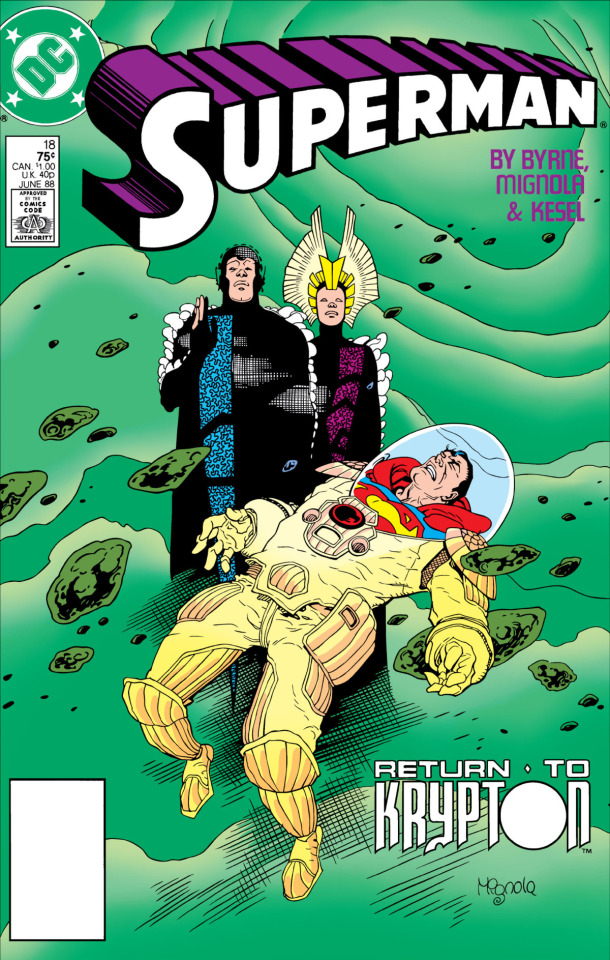
June 1988. 1988 was an extremely ugly year at DC, marked by gratuitous brutality on nearly every front. Not content with his vile take on Krypton in the WORLD OF KRYPTON miniseries (which could be summarized as "sci-fi blood libel"), John Byrne took the time to explain unequivocally that the ugly nativist implications of MAN OF STEEL were no accident.
In this issue, illustrated by Mike Mignola and Karl Kesel, Superman returns to Krypton with the help of Hawkman and Hawkwoman, and finds that it's now a planet-shaped mass of highly radioactive Kryptonite debris. Determined to search for "some trace, some artifact remaining of the race that bred me," Superman borrows a Thanagarian battlesuit and ventures out into the debris field, where the overwhelming radiation causes him to hallucinate an alternate reality where Jor-El found a way for the people of Krypton to survive their world's destruction and emigrate to Earth. This fantasy is narrated in the first person by Jor-El (in the form of excerpts from an imaginary journal), presenting a horrifying, frankly fascistic vision of malevolent immigrants, evil mothers, and populist genocide.
If you've read MAN OF STEEL, much less WORLD OF KRYPTON, it will not surprise you to learn that Superman's fantasy of Kryptonian survival and emigration very quickly turns ugly. As Jor-El's imaginary journal narrates:

In pop culture, the alien invasion story typically represents the fear of the violence of settler colonialism coming home to roost in the imperial core, and you could hardly ask for a more textbook example than this: The refugees from Krypton begin (re)building their own civilization over inhabited human cities, while relegating humans to reservations or concentration camps. Such a fantasy also fuels the delusion of self-indigenization, where settlers appropriatively define themselves as indigenous to the lands they or their ancestors have stolen. This is of course primarily a white fantasy; while the post-reboot Superman books did introduce a few Black and Latino characters, note that there's not a single person of color visible among the humans being interned. Note also that Byrne takes the opportunity to restate the fascistic thesis presented in MAN OF STEEL — that Kryptonian culture is corrupt because Kryptonians have "lived all their lives in isolation, denying their physical beings" in favor of technology and modernity.
That's not all, though. For one, you'll notice that Jor-El also describes as suspect the decision of some of his fellow immigrants "to live apart … to keep themselves aloof from the citizenry of our adopted world"; he acknowledges that the settler colonialism is worse, but he regards cultural self-isolation as inherently bad in its own right. Also, note that the Kryptonians rename Metropolis "New Kandor." As Byrne was most certainly aware, in pre-Crisis Superman lore, Kandor was the former capital of Krypton, stolen and shrunk by Brainiac and later recovered by Superman, who kept the bottled city in his Fortress of Solitude until he was able to find a way to permanently enlarge it. Kandor was, fairly explicitly, a Kryptonian ghetto: a closed Kryptonian community with rigidly defined borders, delimited both physically and by a set of complicated rules about who could enter or leave (and how), within which Kryptonian culture continued more or less as it had for centuries. What Byrne is saying here is that such (literally) ghettoized communities are intrinsically suspicious — that the inability or unwillingness to assimilate is categorically indicative of malign intent. The only virtuous decision for an immigrant or refugee, then, is to choose total and unconditional assimilation, as Superman does at the end of MAN OF STEEL and Jor-El subsequently does here:

Moreover, it's not enough for Jor-El to simply choose to become an Earthman (and implicitly an American); he must also "stand against [his] own race." As the fantasy continues, Jor-El creates synthetic Kryptonite and kills thousands of Kryptonians, forcing many of the survivors to flee into space. Since all of this is a hallucination in Superman's head, the version of Jor-El here represents Superman essentially imagining himself in his father's place, but in case that wasn't clear enough:
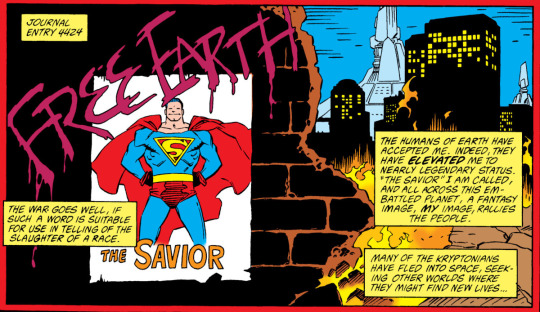
Jor-El does not, so far as we're shown, actually don the Superman costume, but he has expressly taken on that role, which in this case means becoming an explicitly genocidal populist champion. This is not hyperbole: Jor-El "rallies the people" against the evil Kryptonian elite as he carries out "the slaughter of a race."
The final conversation between Jor-El and Lara in the first issue of MAN OF STEEL had painted Lara in a rather negative light; while Jor-El is valorized for his rejection of Kryptonian values, Lara recoils from a vision of the "savage" people of Earth and hopes that their son will show them "proper Kryptonian ways." The unsavory connotations of that conversation (to which Superman could not possibly have been privy) play out even more explicitly in the climax of this fantasy:

In short, Lara becomes the ultimate embodiment of almost everything bad about Byrne's reimagined Krypton. This plays almost like a throwback to the pop psychology of the 1950s and early 1960s (when Byrne was a child), which held that the maternal role had to be carefully regulated, since over-mothering could be just as psychologically damaging as maternal neglect. Perhaps the ultimate satirical exponent of that philosophy in pop culture terms is THE MANCHURIAN CANDIDATE, but it was a common piece of conventional wisdom, expressed here without irony. Lara's final act of villainy is the corruption of Kal-El himself, since in this fantasy, Jor-El has not been able to "save" their son from Kryptonian degeneracy. (Note also that Byrne restates once again his revisionist contention that Kal-El was conceived on Krypton, but actually born on Earth.)

While Jor-El is not wearing a Superman costume in these pages, he is wearing a costume of sorts, an outfit that evokes both Doc Savage and Hugo Danner, the hero of Philip Wylie's influential 1930 novel GLADIATOR, two pre-Superman supermen of the 1930s. Around the same time this issue was published, Roy Thomas was integrating GLADIATOR (which had entered the public domain) into DC continuity in YOUNG ALL-STARS, whose central character Arn "Iron" Munro was Hugo Danner's son. (Munro's usual outfit was a black T-shirt over white trousers, the inverse of what Jor-El wears here.)
Jor-El's scream of anguish marks Superman's return to consciousness, so the fantasy ends at this point, and the Hawks help Superman return to their ship. Superman then provides the following summation of what we've just seen:

Since Superman's fantasy was a hallucination induced by radiation poisoning, one could potentially shrug off its ugliness as just a bad dream, but Superman rejects that, saying, "I'm afraid my vision was accurate," at least in its moral and political implications.
Of course, the principal authorial intent here is to reject and dismiss the Superman continuity Byrne had recently erased, in particular the previous Kryptonian diaspora, but the thesis of this story is perfectly consistent with mainstream American, Canadian, and European attitudes on immigration: Any immigrants or refugees must assimilate, promptly and completely, and those who don't, for whatever reason, represent a dire threat to the polity that must be met with expulsion or annihilation. If the number and/or nature of the immigrants does not allow for prompt assimilation, lethal violence — up to and including genocide — is not only appropriate, but a moral imperative for the survival of the imperial state and/or the "white race" [sic]. There are many people in the real world who expressly believe that, so it's not necessarily surprising to see it expressed so bluntly in a Superman comic, but it is very ugly.
This story was unfortunately not the end of it, so far as Byrne and Superman were concerned. While the fantasy sequence here amounts to Superman picturing himself as his father, the heroically genocidal champion of an imagined reality, it is still just a fantasy, even within the context of the superhero comic narrative. It therefore leaves unanswered (at least for Byrne) the question of whether Superman would actually be willing to commit murder and/or genocide to protect the Earth from others of his kind.
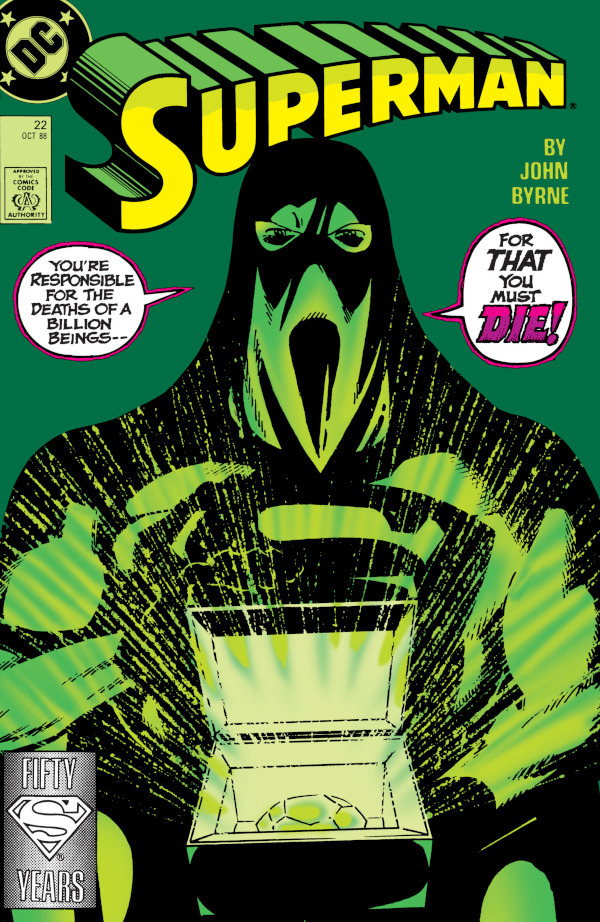
Since Byrne had taken pains to ensure that there were no other living Kryptonians — the only other was the Superboy of the Pocket Universe created to reconcile MAN OF STEEL with the Legion of Super-Heroes, who was already dead — he was obliged to invent some for the purpose. About three months after this issue appeared, Byrne's final storyline (in SUPERMAN #21, ADVENTURES OF SUPERMAN #444, and SUPERMAN #22) introduced three facsimiles of pre-Crisis Phantom Zone villains in the Pocket Universe, whom Superman finally executes after they have completely depopulated the Pocket Universe's Earth (also conveniently ensuring that that world couldn't be used to provide any kind of end runs around post-Crisis continuity, and giving Byrne the opportunity to grind his heel on the earlier Superman mythos one more time).
With that story, the reactionary throughline Byrne had begun in MAN OF STEEL was complete, establishing not only that Superman was now a true-blue, American-born native hero, but also that he was willing to kill other Kryptonian survivors to defend his adoptive white Gentile American culture. "Yikes" doesn't begin to cover it, I'm afraid.
#comics#superman#john byrne#mike mignola#karl kesel#krypton#kryptonite#jor el#kryptonian diaspora#this is one of the most unpleasant superman stories ever#its politics are utterly rancid#i'm still inclined to think world of krypton is worse#but it's a different part of the same horrifying thesis#genocide cw#antisemitism cw#xenophobia cw
21 notes
·
View notes
Note
7! Who's your fave author and why??
7. Who's your favorite author (fanon or canon)?
HMMMM that's a toughie.......... just about every writer for kon whose work i've liked has also had a lot of glaring things i did NOT like, so honestly i don't think i can name a superboy writer!! outside of that, hmmm. kelley puckett is possibly up there just because of his part of batgirl 2000, which of course is the holy grail of cass writing, but i did also have a few nitpicks in there too (mostly regarding how other characters get written, not cass herself. the cass writing fucks so hard).
honestly, i might have to actually go with gene luen yang? i haven't read kenan's super-man run YET but just based on superman smashes the klan and his afterword there, plus what of his kenan writing i have read... mr. yang i trust you with my life. (<- i am NOT immune to stories about immigration and assimilation and feeling like an outsider and all that good good stuff. and he Gets it.)
11 notes
·
View notes
Text
Who should play Martian Manhunter in the DCU?

Martian Manhunter always felt like one of the most important members of the Justice League to me. He is an alien, making him a sort of mentor and friend to Superman, but he is not an Earthling like most. He is a foreigner, the last of his kind, and must shift his likeness in order to assimilate to a new world. As a person of color, his story always felt the most sad, and all too real.
While the Manhunter from Mars is an original member of the Justice League and a staple member of JLA in Justice League Unlimited, J'onn J'onzz has been largely absent from live action films.
While he was retconned as Calvin Swanwick in Zack Snyder's Justice League, we don't get much of him, and he doesn't really contribute to any fight.
With the DCU reboot already featuring alien/alien adjacent heroes such as Blue Beetle, Hawkgirl, Superman, and Green Lantern, Martian Manhunter's return can fit in nicely real soon.
If that is to be true, I have a couple of picks I think can add something new to the character, and become a very fun recurring character for The Justice League and other DCU movies to come.
First, as always, let's answer some questions:
What depictions are we drawing from?
When it comes to Manhunter, there are quite a few solid iterations in both Live Action and Animation. Let's start with the big one.
Carl Lumbly - Justice League/Justice League Unlimited
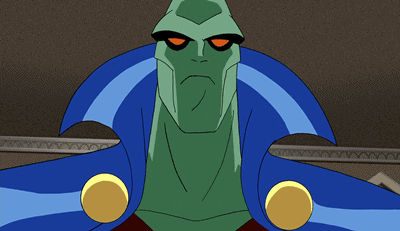
It's hard to not talk Martian Manhunter without bringing up Justice League Unlimited.
Carl Lumbly provided the voice for the character, which is often the voice people hear when they think of Manhunter. He brings wisdom, strength, and sorrow to the character that people often try to emulate, but can never truly duplicate.
He also brought an awkward energy to humanity I quite love. I think it has been missing in other versions. I'd love our Manhunter to be unfamiliar with earth customs, and more importantly question them.
David Harewood - Arrowverse
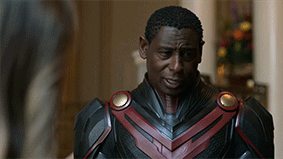
I don't think any show or movie has used Martian Manhunter as effectively as Supergirl.
The initial twist of not being Hank Henshaw and instead being the last son of Mars is still one of my favorite moments in the series. Ever since then, J'onn is used as a mentor to most heroes, sometimes team leader, but always the inspiration of the team.
David Harewood brings a righteous anger to Manhunter at times that I absolutely love. I'd love to carry that over.
This version of J'onn is slightly more optimistic than most, seeing the good in humanity, and believing the world deserves saving.
Overall, he is a fantastic Manhunter, and if you haven't seen Supergirl, you should definitely give it a shot.
Henry Lennix - DCEU

While he is mostly a shut in, there are aspects of this character I quite like.
Manhunter being a reveal in the DC Universe is fun for fans. Trying to figure out what a guy is up to and turning out to be one of the best DC heroes can be a delight if done right.
I also like that this Manhunter is working behind the scenes to help heroes like Superman. Having him starting as a mentor character already and then being a mentor superhero is a fun concept.
While I don't like how much he is on the sidelines for the DCEU, setting him up in multiple movies to finally face his fear and come from the shadows as a person we've already known could've been amazing had Snyder continued on.
And of course, Lennix also has a fantastic voice.
What ethnicity is Martian Manhunter?
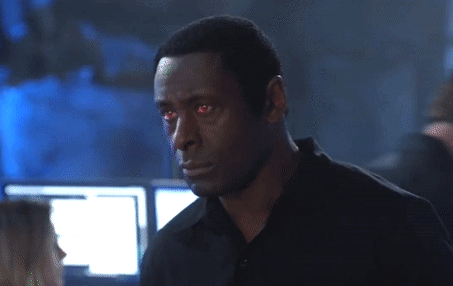
Well, he's a martian.
In most depictions, Manhunter is portrayed by black actors. I think continuing this is important, as his story is an immigrant story, and it appears to be a staple aspect of the character.
Any other stipulations?

I'd like our Manhunter to feel older than our other main characters. If Superman is 30, I'd like Manhunter to feel a couple decades older.
I'm looking for someone in the 50-70 range, but I'd say more towards 50 as he has to feel formidable.
This actor should have a great voice, feel like he a mentor, project strength and sadness, and most importantly, be able to be part of an ensemble.
I'm not looking for a leading man technically. Manhunter feels crucial to the League, but I don't necessarily see him leading his own project. More like Vision in the MCU who comes up in key places and is always a delight.
Unlike other heroes, Manhunters build is inconsequential, as he can shape shift into Manhunter using CGI. So really, any build is good.
As always, I don't want an actor widely known for any other superhero role.
Unlike most of my fancasts, I think I found three I like a lot and would be extremely happy with any of them. It was very close and I went real back and forth. Let's get into it:
3. Rick Worthy

While he is known for other roles such as Supernatural, Battlestar Galactica, The Man in the High Castle, or Vampire Diaries, Rick Worthy has caught my attention from his role as Dean Henry Fogg in The Magicians.
As the Dean, Worthy mentors young heroes on how best to use their abilities all while keeping secrets of his own on a looming threat. If that doesn't scream Manhunter, I don't know what does.
Worthy's Manhunter could be a little more fun than the others. I can see him poking fun at the man dressed as the Bat, or shape shifting into the other heroes to mock them.
I think having a character with a background in Sci-Fi could make the Manhunter reveal harder for people to see coming. I also think Worthy is an actor who won't be bigger than the role.
My main concern is I think he could struggle with the mentoring of heroes without being sarcastic. I'm not sure how genuine Worthy can be as Manhunter, which is why I have him third.
I can still see Worthy playing this role for decades to come, and really chew up scenery.
2. Blair Underwood

Known for roles in films like Rules of Engagement, Set it off and shows such as Agents of SHIELD, American Crime Story, and Dear White People, you've probably seen Blair Underwood in a really well acted piece of media.
Underwood has a smoothness the other actors do not. I can absolutely see Underwood's Manhunter gain a high level job based on his skill and charm.
Underwood also has the most experience being a part of great ensembles. It's an often overlooked skill to be great and amplify the skills of other great actors without being overshadowed. Underwood has that skill which is why he has such an incredible career.
He has experience playing FBI, experience playing a shape shifter in Agents of SHIELD, a mentor (although a bad one) in Dear White People, and perfected all of them.
If I had to put money down as to who would get this role, Underwood has my bet. I could see him cast tomorrow for Superman Legacy and fit in perfectly. But I do have one more I really love.
1. Andre Braugher
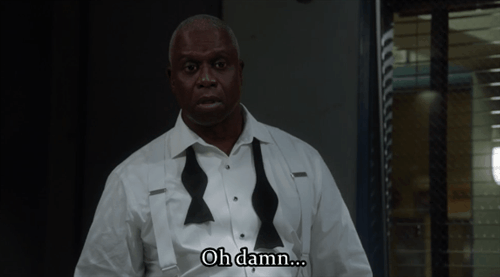
You see it now don't you?
Known for roles in The Good Fight, Bojack Horseman and Men of a Certain Age, Braugher really launched into the zeitgeist as Captain Raymond Holt in Brooklyn Nine Nine.
Captain Holt may be the perfect audition tape for Martian Manhunter.
Older experienced mentor who is othered for being different, doesn't always understand social human interactions, extremely smart, kind, but with a righteous anger.
That's Manhunter.
Braugher through his time in Brooklyn Nine Nine also demonstrated how funny and/or dramatically poignant he can be. Both are needed for Manhunter.
Much like Underwood, Braugher has experience being in large ensembles and bringing out some of the best in other actors. Imagine a scene as good and emotional as the final scene between Holt and Jake between Manhunter and Superman.
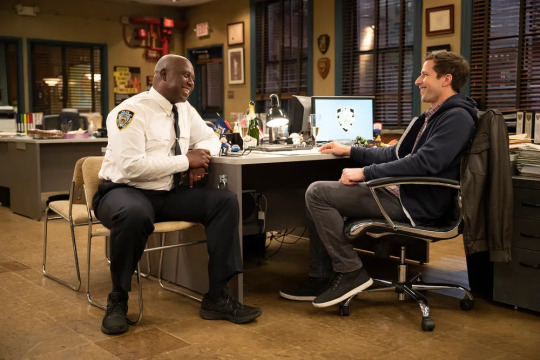
That's the kind of Manhunter the DCU needs.
Thank you for reading! If you'd like to support me, you can:
Follow me at www.facebook.com/romancomicsnews
Follow me on Twitter @diegoleonroman
Follow me on Threads @romanleondiego
Help me pay my student loans by donating!
#dc universe#dc comics#james gunn#dceu#dcu#justice league#superman legacy#justice league unlimited#martian manhunter#j'onn j'onzz#carl lumbly#cw supergirl#supergirl#david harewood#crisis on infinite earths#arrowverse#hank henshaw#zack snyder#zack snyder's justice league#henry lennix#fancasting#fancast#rick worthy#the magicians#dean fogg#dean henry fogg#blair underwood#agents of shield#american crime story#dear white people
9 notes
·
View notes
Text
A summary of why CW Supergirl sucks, born from a year of a growing frustration.
A summary of why CW Supergirl sucks, born from a year of growing frustration.
1.Inabilty to take a risk.
The only one they took was making Alex lesbian and Nia the first trans hero story. Then – fucking nothing. Good characters going dark? Not even Kara’s clone aka RedDaughter. Lobotomizer, who you know, murdered Adam, Lex and wanted to lobotomize entire humanity and hurt Kara “every way imaginable”, all of it was portrayed as “not her fault, blinded by feelings, dark place blah blah”, basically it was all Lex and Kara’s fault, no consequences for her character or arc.
There was nothing controversial, or when it was something like that (aka Lena murdering and lobotomizing people) it showed as something not that important, normal stuff, solved in one ep, no biggie, she was sad, ok???
I was also not even ONCE afraid for the main bunch of the characters. I was fucking SURE no one was going to die and yes, only addictions, villains, one ep randoms or secondary characters I didn’t give a shit about, died. That means there was basically no feelings, even during emotional scenes, what made this show super bland and in the end, forgettable.
-Plus, they knew they got the final season, they knew they could have done anything they wanted. And what they did was making Kara taking her glasses off. If this doesn’t fully describe what kind of shit this show was, then I’m Santa.
Basically WASTED POTENTIAL.
2.Degenaration of the main character.
Yep, sorry not sorry, as much as I love Kara and Melissa, who was born to play Supergirl and did everything even with the crappiest of lines, her character, looking at it from the perspective of 6 seasons, SUCKS for a few reasons:
-What made her unique in the comics, was ignored and forgotten in the show. She was made a female clone of Superman, that was treated badly by the writers. She got similar job, attitude, love interests, his villains.
What she didn’t get was satisfying conclusion (sarcasm).
In comics she was the outsider, the person torn between two places, an immigrant remembering her old life and forced to assimilate in a society of some C class planet, a girl with anger issues, bias, the guilt of being a lone survivor, a traumatized young alien. Something she couldn’t share even with her last living relative aka Clark. It all made her fleshed and complex.
But show ignored it, and made her a happy go lucky, fully assimilated perfect usamerican girl in love with humanity, uwu. What is disappointing, even if this Kara still has charm, innocence and potential - it all makes her boring in the end.
-There is no real character development for her after s1 and 2. She started as fresh hero who tried to manage her superhero, private and work life, while working on her biases. And then, dunno, we got Kara dealing with an every ep villain/issue and some other big season bad. How Kara’s as a character changed? She got more confident in her professional life as a reporter (still, a shitty one) and that’s it. All the traumas, bad shit that happened, deaths, problems, issues, lost love etc. I don’t really feel it all has changed her. I don’t even feel she is more mature in s6 than she was at the end of s2. I don’t feel anything that has happened during the whole series, changed her views, opinions, way of life. When her past experiences helped her later? She stays almost the same for the whole fucking SIX YEARS.
-It happened, because there is no real character arcs for her after s2.
In s3 there was the whole Reign aka her nemesis storyline and finding Argo and her mom, but what was the POINT of it? Beside that Kara realized she didn’t want to be krypotnian and didn’t really give a fuck about her mother, friends and people anymore…? And I still didn’t really grasp it, because the show made a shit way to explain why she didn’t feel at Argo as at in home anymore (because Earth was in danger and needed help? Because she couldn’t be Supergirl at Argo? Because…? Uhm?).
The same goes for s4, 5 and 6. What was the reason of Lobotomizer torturing and hurting Kara every way imaginable and Kara calling her a villain, if a few eps later Kara ended on the same place aka being Lena’s bestie without hard feelings, any consequences or fucking anything? What kind of impact Kara being in Phantom Zone made on her? Fucking one ep, where she can cry in Alex’s arms and then, once again, NOTHING.
-The lack of satisfying conclusion (sarcasm again) for Kara. At the end, I have no idea what did she want, what did she dream on, what was her goal, why she couldn’t have it all, while she wanted it years ago and ALL OTHER CHARACTERS GOT IT. Basically, I don’t know why I should be happy for her, why should I root for her, in the end, I feel like I don’t even know her after six years. What is… fucking sad.
3.Heart and soul of the show. My ASS.
There is no Supergirl without Kara. It can survive without any other character, but NOT without her. And because, as I said, her character development/arc SUCK, we have a sucking show. And sorry not sorry if I upset people, but it happened because the show focused too much on other SuperFriends and other characters. Yes, Alex included. Because no, Kara and Alex are not the heart and soul of the show. Kara should have been. And I don’t get the blind, sometimes fanatical love for this relationship. It’s quite obvious it’s one of the most important relationships in the show. Still, a shocker, show would survive without it. Plus, it’s quite funny, how some people ignore the fact (confirmed by canon TWO TIMES) that for Alex more important than Kara was ALWAYS Jeremiah. Even when he was already dead. Fucking hilarious.
Anyway, my point is that even J’onn and his father got more compelling and emotional arc than Kara ever got and friendly reminder SHE GOT HER FUCKING PARENTS BACK. The same goes for Alex and Esme and Kelly. Damned Agent Liberty had a better written arc than Kara. Damn, Nxy had more compelling story arc and character development than Kara in s6. And it’s tragic.
Remind yourself when was the last time you were really invested in Kara’s story?
4.Fuck you, comic books.
I have no idea how people who actually read Supergirl’s comic books and others issues felt while watching. Kara being dumbed down (plus all the shit I have talked about). J’onn depowered. Brainiac being DUMBED DOWN and parody of himself. Mon-El depowered and in s3 cured from his allergy, zombied, bearded and forced into marriage with fucking Imra. Imra with weird powers. Garth who??? Death of Nura Nal (off screen), murdered by Brainiac. Manchester United and Agent Liberty wasted and turned into well, not anything too complex. Maggie – what? Lex – no comments, especially after how he ended.
And unfortunately, I feel that all of the original comic book characters suffered for the additions created by the show, aka Alex, Lena, Nia, Kelly. Like, you can feel they were the producers and writers “babies” and they did everything to made them cool and interesting (what ended with some weird stuff like Lobotomizer being a magical unicorn and Nia got some… weird powers. Whatever).
5.Creators hated this show, you can’t change my mind.
The fact Jessica Gossip Girl and Robert had NO FUCKING idea what to do with Kara or this show after s3 and the AK drama, is obvious. The sad fact is that the writers didn’t know what to do either. I feel like after AK, no one wanted to be associated with this show, the old writers left the show and we got bunch of new-in-the-business-folks who didn’t even care to watch past seasons.
In the end, it was quite obvious that all people involved were done with this show and just wanted out, cast included. And remembering what also the supercorp shippers have done, I can’t really blame them. Still, there was no love for this show in the creators room and it’s sad when you compare it to the shows that was leaded by producers/writers/actors who were fans themselves.
6.The show is already outdated. Focusing on so called modern problems made it forgettable and bland, when you compare it to other shows.
Yes, I talk about the Trump presidential plot in s4. Also, the whole immigration plot were so heavily, cheesy and dumbly handled, made no sense and was something we saw hundreds of times in other fiction (and it was handled 100 times better). Andrea’s alternative reality device that sucked people in it? Any Black Mirror ep about stuff like that was better and more memorable. I already don’t even remember why the device was so deadly. Technology bad? Oh, boy.
Also, I KNOW comic books were always connected to the political stuff, but you can handle it in a good and bad way. Supergirl made it usually cringy.
See how stereotypically they portrayed the president in s4. It was not even bad enough to become funny. The whole Kaznia part was nothing more than a xenophobic, stereotypical approach to Eastern Europe. Remember when J’onn said he keeps his black man appearance because he wanted to be… minority or something? Guess what? He became a black man because HANK HANSHAW WAS A BLACK MAN. There was nothing DEEP in it for fuck’s sake! M’gann? So, a white Martian who… pretends to be a green one and then keeps that, because… you know… there are better and worse Martians. Or something. You know, greens good, white bad and ugly.
Then, they did a good job with Nia’s trans-superhero story. And then, with Kelly, I see what they wanted to show, but it was a bad timing and well, all what she wanted to express was overshadowed by that one, line about Kara not getting what trauma is. The list goes on.
7. Luthors.
Cancer of the show. Sue me.
8.It’s so fucking dumb.
We all know that this show is about an alien who because of fucking sun became superpowered, can fly, wears idiotic suit and can’t be recognized because of glasses. We all get the conception. We get it. We know it’s for kids…
But there is a difference between following the worldbuilding and making shit so fucking dumb you roll your eyes so hard that you see the insides of your skull. The show treats the viewers like IDIOTS who don’t remember a shit that happened previous ep.
The… jewels or whatever it was called, that they tried to gather in s6. Not getting the idea of time travel. J’onn erasing the knowledge of Kara being Supergirl from Alex and like 10 max DEO agents, while all fucking DEO knew that, because Kara was constantly walking around as Kara Danvers in s2 and 3. And J’onn suddenly, out of nowhere refusing to read people’s minds, but being ok with changing people’s minds, but not informing that oopsie doopsie, he can’t change them back? And what was the fucking reason in the end? Writers want to tell me, that’s it more logical to change memories of Alex and TEN other people, than brainwashing ONE colonel??? Like? And the scene when Alex finally remembers, while Kara is dying after the fight with RedDaughter and her way to save her is… putting grass on her? I’m sorry? It was supposed to be emotional but I died from laughter? It was so fucking dumb that it erased cells from my brain??
And don’t even let me start about Kara absorbing WHOLE SUN in 10 minutes because Jesus Fucking Christ people actually died watching this scene. Like, yeah, erasing sun, what bad could happen to Earth without it even for a few days. Like yeah, Kara, a living being ABSORBING FUCKING SUN. In like a few minutes. Do you know how fast the sun rays come from Sun to Earth? Probably you do, SG writers don’t. And then, she just what, farted? And all what she absorbed came back to sun in a second? Uhmmmmmmmmmmmm…
And let’s ignore, like we ignored so many other shit, how many times Kara and other super beings totally forgot they had, ya know, superpowers, because plot needed it.
It’s all so goddamned dumb that is not even funny. And what’s worse, the show is not funny, the jokes are pathetic, it’s like watching your drunken uncle on a family gathering.
9.Contradictions, hypocrisy, blah blah blah
Do you remember how everybody was moaning how Kara is the strongest, the best, the strongest, the most unique, the strongest, the most amazing unicorn in Earth’s history? You could create a drinking game in s2 finale aka taking a shot when you heard something like that, hangover guaranteed.
It’s the whole show’s problem. Exposition and explaining instead of actually showing it in the show. They talk. All the time. Explaining everything. And then you get something contradicting.
Like how Danvers sisters are the best sisters, buddies, blah blah blah. And then we get aggressive Alex pouring her life frustrations on Kara (job, Jeremiah, Esme). And what is funny, we never really did them sitting down and really discussing it, and it’s a show about talking. I mean, of course, they would die for each other without a second of hesitation, but all people talk about are the couch scenes sniff! Sniff!, while happily ignoring the co-dependency problem.
10.Fucking fandom
Let me just say that I have a theory that says if the show is shitty and there is nothing beside the ships you can be excited about, the fandom turns into an utter ocean of crap. And maybe it would have been not that bad, if the fandom hadn’t changed my perspective on some actress and basically made my SG experience a living hell.
If you have anything to add – be my guest ==’
27 notes
·
View notes
Text
My first piece as the Arts & Literature editor at the University Observer. Issue one of the year is always a mad dash - it's typically made almost entirely in house, as you don't yet have a contributor list, so everyone is jumping from section to section, filling spaces for each other and writing 4,000 words after midnight the day before we go to print.
I'm a nerd at heart (always and forever) so of course my first piece when I got even a modicum of editorial control was about the difference in how the stories of Superman and Supergirl work as immigrant narratives.
The article was originally published in September 2017, and can be read at the link above, or in the read below.
The concept of Superman, at its core, is that of a god. He is a supernatural, infallible being who protects and serves humanity at a level that would be impossible for any other singular person. However, behind Superman, exists a man. Clark Kent, the humanity which motivates Superman, drives him to be the hero, has became such a cultural milestone. Due to this, Clark is where most of the internal conflict originates throughout the various iterations of the character, since his conception in 1938. A large portion of this conflict is derived from these conflicting personas. Clark, a humble, kind child of farmers from Kansas, and Kal-El, the superpowered ‘Last Son of Krypton’, battle for dominance in the life of Superman. His attempts to balance these two identities is what creates the majority of his internal struggle.
These identities represent the two worlds, the two origins, he has to balance. On the one hand, Superman is a farm boy from Smallville. The only son to his parents, he is a quiet reporter, an All-American father and loving husband. On the other, he is Kryptonian. He is one of two survivors of his home planet, and depending on the specific run, the sole owner to the knowledge of Krypton. He exists in an ever-present struggle between his lived history: the knowledge of where he has come from, and the knowledge that he will never truly experience the land which he is supposed to call ‘home’.
This struggle is one faced by many who immigrated at a young age, particularly those who were adopted into their new home, as Clark was. This has not gone unnoticed by writers either, many new recent issues depict Superman protecting and aligning himself with immigrants faced with violence or deportation to violent or unfamiliar lands. As well as this, fans and creators alike have taken to referring to Superman as a “DREAMer”, a young immigrant who is fully assimilated to American life by adulthood, who arrived to the United States without documentation, and followed the specific “DREAMer” path to gain citizenship.
Superman’s Kryptonian identity remains a background feature throughout his multiple iterations, creating internal drama surrounding his guilt for not engaging with it enough in his day to day life. Writers typically alternate between neglecting visits to the centre of Kryptonian history on Earth, and most recently, his internal debate over how much of his Kryptonian identity he wishes to pass on to his half-Kryptonian son, Jonathan. However, these underlying conflicts are ever present as moments for introspection in an otherwise action heavy comic. This conflict is seen far more clearly in one of Superman’s main companion comics, Supergirl. Supergirl, which tells the stories of Kara Zor-El, Clark’s elder cousin and the ‘last daughter of Krypton’, is typically depicted as arriving to Earth five to ten years after the emergence of Superman. Clark typically being in his mid-to-late twenties at the time of her arrival. She is in her late teens when we first encounter her, escaping Krypton upon its demise. Immediately, she struggles to find a place in this new and confusing world she finds herself in. She cannot speak the language, has no friends or support network, and her only existing family is twenty-five to thirty years older than she is. Her story is that of a struggle for assimilation, of the complexities of finding your way in a nation you have no idea how to navigate or how to communicate in.
Due to this, Kara struggles to find a place on Earth while still maintaining her heritage, an intrinsic part of herself. To her, to give up her heritage is to give up Krypton, a land to which she can never return. This struggle is absent from Clark’s story, as he grew up in the heartland of America, only discovering his heritage later in life.
Both narratives are easily discernible, as are the complexities of the aftermath of immigration, the settling and the settled, those who are detached from their heritage by circumstance and those who have to find a way to balance it with their new life. It serves to create internal tension for the work, to create a more rounded story than ‘Godlike Character Saves the Day #978’, by adding a level of political commentary that comics are seldom without. Without this, the stories would never have withstood the test of time and would likely have faded into obscurity, along with countless other superhero stories which lacked the internal conflict to make their tale eternal.
1 note
·
View note
Note
Omfg I only read a bit of what anon wrote but it’s insanely wrong and antisemitic. Superman was literally created by two Jewish people as a commentary on what it’s like being an immigrant in North America who can almost fully assimilate by hiding and denying their identity, while the rest of their people are in danger of mass annihilation. Two Jews FIRST WROTE HIM IN 1938. “h*tler’s ideal society” - please ban that POS again and permanently for being ahistorical antisemitic scum. Literally a Jewish analogy and a story about punching out Nazis and fighting against xenophobia and for acceptance of immigrants and minorities. Meanwhile anon wants to rewrite history, take a Jewish story and say it’s actually the dream story of the people MASS MURDERING THEM at the exact moment the story was written!? Anon please never try historical literary analysis again, or at least work harder to avoid butchering and desecrating the art and history of minorities.
While I understand your anger at the misconception, I know anon's intentions were not at all aligned with rewriting the history of superman's conception. i once stated that i thought wonder woman was likely made with the intention of being feminist but it didn't really pan out and another gyn let me know the true original origins.
she and i were pontificating on things, fully admitting that neither of us had really gone too in depth on the history of characters who were not our preferred faves. she even admits at one moment that she really only focused on batman.
again, i understand feeling riled up. but i don't think that was at all the point of her words, especially if you read more into the things she said.
1 note
·
View note
Text
Alien Nation 5
Slag Like Me
by Barry B. Longyear
1994 Pocket Books
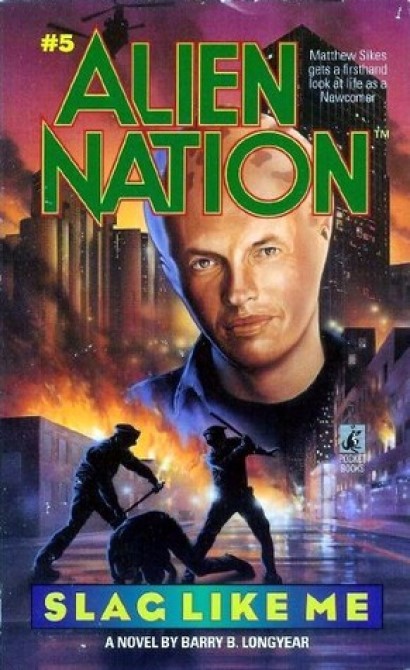
In 1959, journalist John Howard Griffin disguised himself as a Black man using tanning booths, medication, and make up, and travelled the American South, recording the experience for Sepia magazine. Unlike the similarly themed Soul Man...
youtube
his book Black Like Me seems to still be well regarded. I was familiar with the parodies, from Eddie Murphy in Saturday Night Live...
youtube
to Chris Morris' Brass Eye.
dailymotion
Even Superman's Girl Friend, Lois Lane, gets in on the act

And the Punisher. Oof.
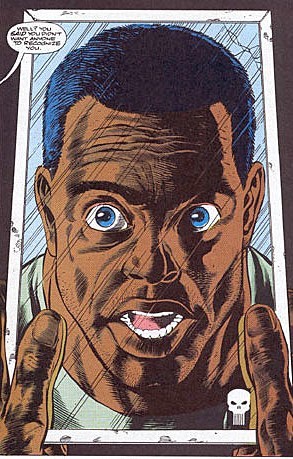
In Slag Like Me, a human reporter undergoes surgical treatment to look Tenctonese. He goes undercover in LA, hangs around gangsters, and exposes bigoted police. When he goes missing, LAPD and the FBI investigate, and Matthew Sikes undergoes the same procedure to flush out whoever did whatever to the reporter.
Meanwhile, George Francisco is partnered with former overseer and current FBI agent Paul Iniko to chase down leads, such as the exposed crooked cops and an angry neighbor.
I don't know if this story was based on unused season two scripts, and tie-in novels come with a lot of restrictions, so I don't want to assign blame, but everything about Slag Like Me gets it wrong.
Alien Nation is a metaphor for immigration, assimilation, and bigotry. These themes are baked into every scene of every story. I struggle to comprehend the creative mind that, after a movie, 22 television episodes, and four novels, decides "Hey, how about we make this next book about racism?" It also falls into the same trap as some X-Man stories - instead of using fictional bigotry to highlight and explore actual bigotry, it uses actual racism as a metaphor to explore the real theme, fictional racism against aliens who do not exist. And the discussions on racism and bigotry are not subtextual here, it's pure soapboxing.
One would think, given the title and cover and all, the main story would be Sikes living life as a newcomer. You would be wrong. A decent amount of page space is budgeted to him preparing, but he's barely out in public in disguise and can't manage to stay in character for more than two minutes. His first undercover act is to make an appointment with a Tenctonese gang leader, to whom he instantly announces that he is a human cop.
Very quickly they're pulled over and beaten up by the police. Matt is taken to the hospital and has amnesia, so I was hoping we'd have a bit where he would think he was Tenctonese for a while, but nope, he gets his memory back almost right away and promptly tells everyone he is a human cop. Sikes is not very good at going undercover.
At no time did the foundational premise of the book, Sikes going undercover as a Newcomer, have any affect on the plot or themes, other than to discover that LA cops would be as mean to Newcomers as they are to everyone else, which Sikes already knows.
The mystery plot is equally disappointing. Various conspiracies are hinted out before it's revealed to be characters who are named in passing once, and they did it for dumb reasons. Some mysteries have non-sequitur endings that reflect the chaotic nature of real crime, other times it reads like the author didn't feel like wrapping everything up and just picked a killer at random. This felt like the latter.
As with the last book, Sikes and Francisco are split up through most of the story, denying the buddy cop element, and is replace by Francisco and Iniko. We get kind of a Bugs/Daffy, Mickey/Donald deal where Francisco goes from being the rational half of the duo to being the irrational one. Pretty much all the soap opera elements, such as Francisco's home life, are neglected. We do get a little bit more of Dobbs, Lawrence Hilton-Jacobs' character, which was nice.
Paperback from Amazon
1 note
·
View note
Text
Interview with director and cast – The Hummingbird Project
STACK caught up with the stars of The Hummingbird Project, Jesse Eisenberg and Alexander Skarsgård, and director Kim Nguyen at the Toronto International Film Festival.
Alexander Skarsgård is practically unrecognisable In Kim Nguyen’s The Hummingbird Project, an ambitious tale of humanity versus corporate greed.
Starring opposite Jesse Eisenberg, the actors play cousins in this high-stakes race to build a fibre-optic cable in a straight line between Kansas and New Jersey, where millions of dollars are on the line.
Skarsgård’s Anton is the brains behind the project while Eisenberg’s Vincent is the hustler, pushing each other to breaking point to achieve their goal. Dogged by their old boss, and now nemesis, Salma Hayek is in fine form as a sociopath High Frequency trader, relentless in her bid to stop them in a race where winning is measured by milliseconds.
Sporting a balding pate for his role as a digital physics genius, Skarsgård sports a full head of hair when STACK meets with the actors at the Toronto International Film Festival.
“I barely recognised myself with no hair,” laughs the actor whose film and TV roles include The Legend of Tarzan, True Blood and Big Little Lies. “And Jesse didn’t recognise me for two months!”
Somewhat surprisingly, Skarsgård tells us he even suggested the bald look, “That’s how I envisioned the character when I read it and fortunately Kim liked the idea. After I described how I saw Anton, Kim sent me a reference photo in an oversized cardigan with that balding ‘donut‘, kind of hunched over, and I was like ‘That’s Anton! Perfect.’
“So I loved it. It was incredible. I think most actors love an opportunity like that and really embrace it. It’s part of the job when you can make a drastic transformation; incredibly rewarding and fun,” says the actor who shaved his hair, gluing on a lace-line of thinning hair, plucking out errant hairs from his dome as filming progressed. “It was torturous, my entire scalp was pulsating.”
“He plucked his hair out, like hair by hair, with a tweezer,” affirms Eisenberg. “I’ve never seen an actor undergo actual, physical pain to change their look. Normally you would just have to shave in the morning but he literally plucked his hair out one by one for hours and hours.”
More accustomed to being cast as the hyper-active genius/geek – Oscar-nominated for his performance as Mark Zuckerberg in The Social Network and further demonstrated by his roles in the Now You See Me franchise and as Lex Luthor in Batman v Superman: Dawn of Justice – Eisenberg enjoyed flipping the coin.
Immediately drawn to Nguyen’s script, he says, “When I read it, I thought Kim was trying to write about second generation Jewish immigrants, of which I am a part. I thought he was really getting at something in the culture that I don’t even know if he was necessarily intending, that drive to assimilate into American culture. When you are hungry to assimilate, you do extreme things like my own family did when they first came from Poland.
“Some people would even go to the rich neighbourhoods and get their garbage and refurbish it, selling it to the poor people. When you are hungry and trying to assimilate into a rich culture, you do stuff like that. And so I thought this movie was really a story of people who are so desperate to fit in that they do this crazy thing and, only at the end, do they realise the absurd lengths they went to,“ says Eisenberg.
Nguyen is more pragmatic. “Many years ago, I was struck with this amazing premise of people digging thousand-mile long tunnels to try and shave a couple of milliseconds off the time it took to make their stock market trades. Madness,” says the Canadian/Vietnamese director.
“It immediately made sense to explore if there was a movie to be made around that high concept. I had this haunting image in my head of stock market hustlers struggling to walk through swamps and muddy forests in their expensive suits, putting their sanity on the line – all for the good old dollar.
“Little did I know how complex it would be in bringing this to the screen. We talked with experts of every scientific expertise: quantum physics experts, fibre optic physicists, highly specialised tunnel digging experts who dig hundred-mile-long, four-inch-wide tunnels for a living and High Frequency trading experts dealing with daily billion-dollar money flows… Boy, what a ride,” says Nguyen who shot The Hummingbird Project on location in Montreal.
If Eisenberg isn’t the actual brains behind the enterprise, then he infuses the character with his familiar high-speed speech pattern. “What I loved about Vincent is that he’s really manipulative and there’s a sleazy hustler quality to him. And those are people who don’t think before they speak, because they are so comfortable talking and they don’t let other people get a word in. I actually had more dialogue in this movie than on any other project so I wanted to make sure I spoke as quickly as possible,” he says.
A cautionary tale about the lengths people will go to achieve success, Eisenberg understands the drive behind The Hummingbird Project’s characters. “I compared it to when I was younger and was so desperate to write and act in a play, doing so much to get my plays on, to a point of almost destroying personal relationships and taxing my body past a point that was healthy.
“Oftentimes you do things that, only in retrospect, you realise how dangerous it was, but at the time you are still focused on the goal. I think that’s what this movie captures, and especially for my character going through some really tragic things throughout the movie.”
Skarsgård believes his own character’s motivation comes from a different place.
“Anton is not driven by those things. He’s not interested in success or recognition from society or even money. This endeavour is very simple for him – he’s doing it because his cousin asks him to do it.”
“I find that quite romantic in a way, that it’s this absolute insane project yet he does it, unquestioningly, simply because his cousin asks him. But then it becomes a personal challenge and that’s when he goes down the rabbit hole of trying to cut that one millisecond.
“And I love that it’s not about I need to raise three million dollars to save my family or to save the house and we’re about to get evicted, which is usually a trope in a movie; the motivating factor for a character. I found that so refreshing.”
Sporting his unattractive balding crown for three months enabled the striking 6’ 4” Swede to go incognito. “It looked very strange on days off because, when I wasn’t shooting, I obviously didn’t need to shave. So I would have stubble on top, and then this almost monk-like hairline,” he laughs. “I even went to some like fashion thing in New York and got a lot of very weird looks.”
• The Hummingbird Project is in cinemas on April 25
source
0 notes
Text
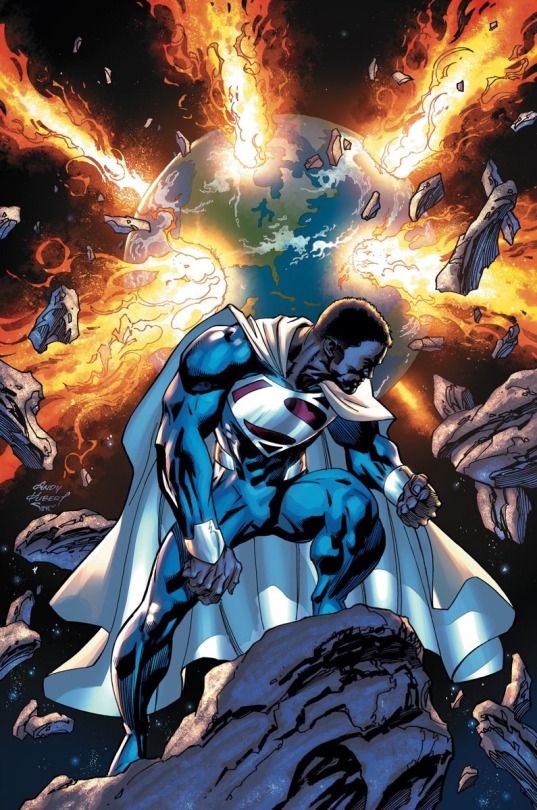

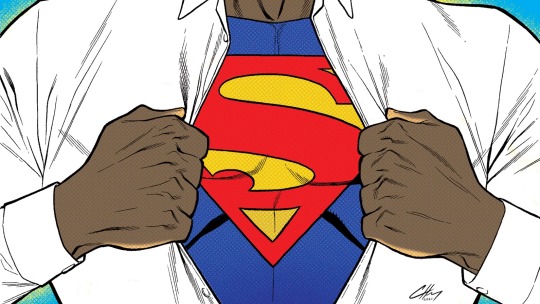
I swear to Rao I will give all my money to DC if this happens
#superman#dcu#dceu#calvin ellis#earth 23#black superman#look at all the racist fanboys losing their fucking minds#lol#the superman story is a story of immigration and assimilation#it makes soooo much more sense to have a black person portray kal el#just like miles morales and spider-man#please bring this story to my black ass comic book loving ass
72 notes
·
View notes
Note
Why is Superman Smashes the Klan so good?
Because it's a story that manages to be both about relevant topics and also about how great Superman is.
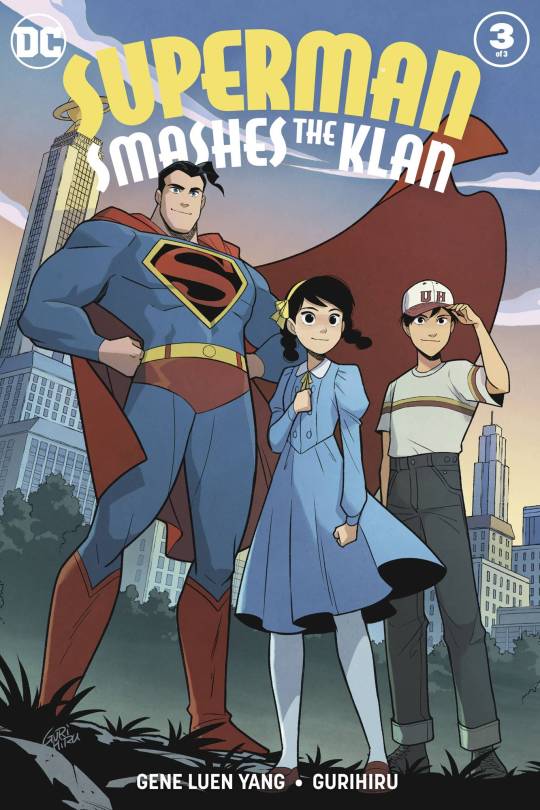
When this came out I was so utterly sick of origin stories that hearing this planned to touch on similar beats made me groan. After Yang wrote my favorite new Superman in Kenan however, I was eager to see him take another stab at Clark and did he ever deliver. This is the best Superman story since All-Star Superman, and despite being a book aimed at young adults, one of the best "dark" Superman stories not written by Alan Moore. Proof that Superman doesn't have to be toothless "wholesome" nostalgia bait AND that a story doesn't need sex scenes or naughty words to be mature.
Yang has talked before about seeing a strong connection between Superman and his own parents. His parents were desperate to assimilate into their new country, to be "good Americans", and worked hard to play down their "otherness" (something that many versions of Superman do as well). Alien refugee Kal-El exchanges his funny sounding name for the Anglicized "Clark Kent", and works hard to make sure that humans know he's not a threat. More than anything Clark wants to be accepted as one of us, a desire that Superman Smashes The Klan forces him to confront and reexamine. At the start of the story Clark is at his Golden Age power levels, it's a specific plot point that he can't fly just yet. Reason why has nothing to do with biology or power levels, but instead opts to tie Superman's powers to his feelings of self-worth and identity. Clark intentionally limits himself to only doing "super" versions of what humans can do: run fast, lift heavy weights, shrug off damage, etc. Flying, heat vision, arctic breath, x-ray vision, these are powers that mark him as something different, something alien. Hiding his nature requires him to suppress them until the events of the story eventually compel him to embrace these gifts of his heritage.
Clark's journey is paralleled with a family of immigrants who can't hide who they are: The Lees. Roberta Lee is the co-protagonist of SSTK, and her perspective is just as important to the narrative as Clark's is. Roberta's family moved from Chinatown to a "nicer" whiter area of Metropolis on account of her father acquiring a good position with the Metropolis Health Department. They're the only Chinese-Americans that their new neighborhood has, and how they struggle to assimilate and fit in acts as a parallel to Superman's struggles to suppress his heritage. Mr. Lee is adamant that the family speaks English and tries to show to everyone that he and his family are "good Americans". Mrs. Lee loves her family and tries to keep everyone's spirits high, but struggles to speak English to the extent her husband wants. Tommy Lee quickly makes friends thanks to his athletic ability and humor, but also utilizes ethnic stereotypes about Chinese-Americans in his jokes, such as pretending to know Confucius or referring to his family and himself as "wontons". Tommy is just as desperate for outside acceptance as his father, but it's more unconscious on his part, when Roberta calls him out on it he gets defensive and snipes back at her.
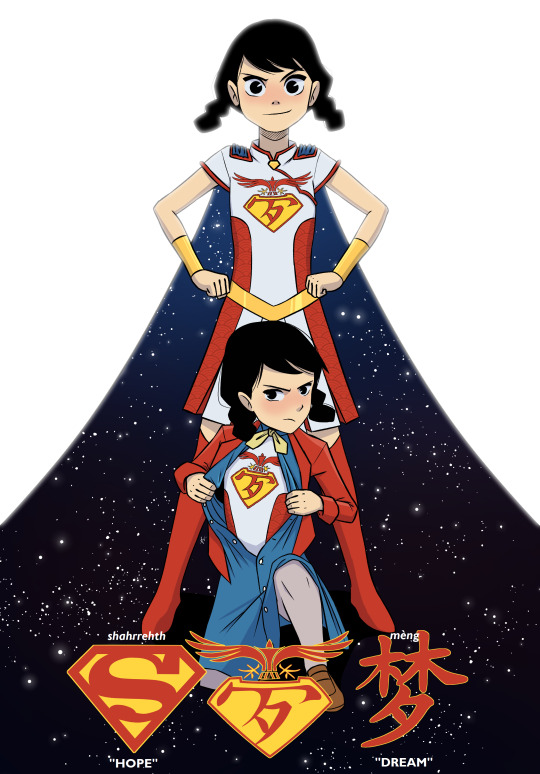
Roberta herself is about as un-Superman as you can get physically. She's a sickly kid who throws up a lot when she goes for long rides, she's shy and finds making friends harder than her brother, but Roberta has a courageous streak inside that shows itself when her family needs her. She stands up for her brother when Chuck Riggs uses ethnic slurs against Tommy. She tells her mom and dad that she doesn't want to move after the Klan tries to burn their house down. After her brother gets abducted by the Klan, she goes to the Daily Planet for help. Roberta repeatedly confronts Chuck about his ties to the Klan and refuses to back down or be intimidated by him. For Superman she serves as the catalyst that pushes him to no longer reject his roots when she asks him why does he have to be less than he is to be accepted. Much like Superman, Roberta's story is one where she learns the value of being true to yourself, and not letting others shame you for where you come from. Even the ends of their character arcs are the same! Clark learns and embraces his Kryptonian nature, including his Kryptonian name "Kal-El". Roberta ends her journey of self-growth by getting a job as a cub reporter and embracing her birth name: Lan-Shin Lee (God I loved that reveal, Superman and those LL's!). Someone sent in a bunch of asks about Lan-Shin that unfortunately didn't all come through, I only got 5 of your 9 part post, but I loooooove Lan-Shin and would be thrilled were she to show up in the mainstream universe.
Also I must say, this is probably the most nuanced portrayal of bigots I've seen. Three characters act as conduits for racism and allow Yang to examine prejudice in American society: Chuck, his uncle Matt, and Dr. Segret Wilson. Chuck is torn between the racism ingrained into him by his uncle Matt, and the budding friendship that grows over the course of the story between himself and Tommy. Deep down Chuck knows that his racist beliefs are wrong, but he doesn't want to think of his family as "evil", especially since his uncle Matt took him and his mom in to his house. After his uncle attacks the Unity House baseball game however, Chuck sides with the Lees and opposes his uncle. Chuck is not so lost that he has completely accepted the Klan's warped values, and is able to ultimately choose the right side. Yang has mentioned that post-BLM protests he probably would have written SSTK differently, and I suspect one of the biggest changes he would've made was that Chuck would not have been redeemed in the end. Personally I believe Chuck's rejection of the racist ideals of his uncle is better in-line with the core Superman ethos that there are no lost causes, realistic or no, and I liked how Chuck's story ended. It also fits with how the Superman radio shows anti-Klan episodes helped turn kids and adults against the Klan, something Yang brings up in the backmatter essays.
Matt Riggs meanwhile is a true believer in the Klan's mission. He genuinely hates immigrants and minorities, seeing them as "polluting" American society, and proselyting white supremacy to everyone he meets, even Superman! Some positive traits are present in Matt, he's forgiving towards Chuck for "embarrassing" him at the cross burning at the Lees, he tells Chuck that self-control is important and he should apologize for getting into a fight with another baseball team member, but it's all overshadowed by his bigotry. Chuck "embarrassed" him by not burning the Lees house down, and he immediately does a 180 on Chuck apologizing once he learns the person he fought with wasn't a WASP. By the end of the story he tries to kill both Superman and himself, preferring to die rather than live in a society that treats non-whites as equals.
Dr. Segret Wilson personifies the third type of racism, the kind that cynically manipulates the bigotry of others towards his own benefit. Wilson is also a white supremacist, but one who doesn't want to exterminate minorities merely exploit them, such as how he hires Mr. Lee to work for the "Metropolis Health Department". He chastises Matt for getting the Metropolis branch of the Klan locked up by publicly attacking the Daily Planet, mocking Matt for buying into the "slop" that is fed to low ranking members. Such low ranking members are tools to be exploited, particularly by demanding they pay fees to be initiated and to acquire Klan robes, which Wilson mandates to grow his personal wealth. The true foe that Wilson hates and fears is Superman, because Superman has power that could topple Wilson's business of hate.
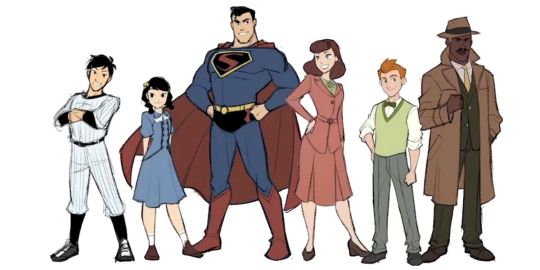
In line with my belief that Superman's Deadly Sin is Wrath, this is a story where anger, hatred, and resentment are central topics. Superman's temper is tied in part to his powers, with his ability to fly and shoot heat vision first manifesting when his childhood friend Pete Ross is being bullied by Kenny and Kyle Braverman. Rage is what fuels the low ranking members of the Klan, against minorities who they see as stealing jobs, destroying American culture, and threatening their positions in society. Wilson feels rage towards Superman for threatening his position in life. Matt feels rage towards the Lees for "polluting" America, as well as Wilson for "selling out" the white race and kills him for it.
Repression is also a central theme, with both Superman and the Lees struggling to repress the traits in themselves that mark them as different from their fellow Americans. At the end both Superman and the Lees find acceptance in who they are. Superman begins using his full range of powers and speaking Kryptonese with his birth parents projections openly. He tells the truth of his heritage to Metropolis in order to no longer have to limit himself to help them. This is another area of the story that I suspect would be handled differently were Yang to write it now. As it is, at first everyone rejects Superman for being an alien but the Unity House kids shame them into reaccepting him because of all the good he has done. My guess is Yang would not have the people reaccept Superman at the end, he'd be an outcast and have to continue the fight for Truth and Justice without public acceptance, which would still be an interesting if sad ending. Meanwhile the Lees begin eating Chinese foods again, and speak Cantonese at home without Mr. Lee admonishing them for it. By embracing their ethnic and cultural heritage, the family is able to grow in confidence and reclaim their sense of pride.
Superman Smashes The Klan is a story that will make anyone from kids to adults laugh, cry, and feel empowered. After reading this, Yang solidified his place in my top 10 Superman writers of all time, and also as a writer I'm eager to follow elsewhere (checked out Shang-Chi just because he was writing it and I've started working through Yang's bibliography). Much as I've gushed about Yang comics are a team effort, and Gurihiru knocked this out of the park. Art in this book is phenomenal, able to switch from cute, to scary, to inspiring, to action packed whenever the story needs it. Their depiction of Superman and his world is one of my all time favorites, and I would be ecstatic to see them return to Superman in another story.

Great as the story is, I haven't seen nearly enough praise for the excellent back matter essays that Yang wrote and are in the back matter of the book. These essays explore American history as well as the history of Superman, mixed in with details of Yang's autobiography, and are well worth reading. Seriously if you ever wonder why Superman is "important" read those essays in addition to the story and you'll see. It's not just character shilling about how great Superman is, he's had a positive real world impact, and I can only hope that he will continue to do so.
162 notes
·
View notes
Note
abt ur Judaism post! what do u think abt how superman was created by jewish men and influenced by jewish figures (like Moses) and elements? is it cool, weird, good, lacking or anything? would u like it to be more apparent with how they write him?
Hey Anon!
Great question. I’ve had a few posts about this in the past, and for some reason it rubs some people the wrong way, which I don’t really get.
My opinion (just mine) on Superman’s Jewish Origins:
If you dig a little deeper, almost everything integral to Superman’s character (which I’ll share later) reflects Jewish concepts of justice, refugee status, persecution, and assimilation.
Personally, I think as long as folks remember that background, and respect it, Superman’s character can continue to evolve and change. The exception to this (for me) was Snyder’s Jesus-heavy motifs of Clark/Superman in BVS, which, as you mentioned, could have easily been subbed with Moses elements.
The story of Jewish persecution is, in many ways, completely separate from Jesus. It happened long before he was even around. But that can be tough to convey to audiences that don’t know the Jewish history behind Superman’s origins, and indeed see the white/Christian characterization of Clark as an “all American” hero and don’t think much beyond it.
So -- what about Superman is actually Jewish, or Jewish-inspired?
The answer is, surprisingly, a lot. I skimmed a few articles to refresh my memory on this, so here’s a few examples:
Kal-El’s origin on Krypton -- a failing planet about to explode -- and his hurried flight by parents desperately trying to save him from death, and staying behind themselves as he’s sent to earth, is a direct reference to the common Jewish story of flight at the beginning of the 20th century.
Superman’s creators were the children of Jewish immigrants. More specifically, the children of Jewish immigrants fleeing 1930′s Europe and its impending destruction. Sound familiar?
In the Holocaust, many Jewish families would have to make the terrible decision to smuggle their children out of ghettos or camps and into other countries, while they remained behind.
Clark’s characterization is influenced heavily by his lost connection to Krypton, his parents, and his powers. This longing is in conflict to the happy, simple life he leads in Kansas.
Jewish immigrants fleeing persecution, as well as their American children, often felt like they were living “in two worlds”. Tradition warred with assimilation, or the need to hide and stay safe, and Jewish Americans growing up in this period often didn’t know where they belonged.
Clark often faces villains or forces that make him choose between his Kryptonian heritage, and his life on Earth.
Often, this forces a comparison between Superman and Moses, as well -- an important Jewish figure who was also cast out by Jewish parents into gentile hands for his own safety, who grew up and discovered his Jewish community was at war with the adoptive life he had lived.
Kal-El, Jor-El, etc
In the Torah, or the scrolls which contain the original Old Testament, the Hebrew suffix “el” means “of God.” It denotes angels (Gabriel, Michael, Raphael, etc) as well as other biblical names.
Kal-El would mean “voice of God”
Jor-El would mean “God will uplift” or the “uplifting of God”
Superman as a modern “Golem”
Though not directly referenced, many have drawn connections between Clark’s ability to turn into Superman, a defender of the weak and purveyor of Justice, as an allusion to the Jewish concept of a Golem.
A Golem is a magical clay figure that can be brought to life by a Hebrew scroll placed into its mouth. Historically, it is said to protect the Jewish community, those battling antisemitism, and those who are powerless.
This connection is bolstered by one of superman’s creators losing his father to a shooting in New York as a child, and feeling powerless against such injustice.
So, why is an immigrant story of assimilation inherently Jewish?
Another great question. Isn’t the immigrant story of seeking refuge in an unfamiliar world universal, in many ways?
Yes, it definitely can be. But I would make the argument that Superman’s creators, the context of 1930′s Europe, and the Jewish concepts of justice (and naming) woven into Superman’s characterization indicate that this story is inherently about the Jewish experience.
As a final point, I would bring up the devastation that the Holocaust had on the Jewish global population. Just like Krypton, much of the historical culture, traditions, and treasures were destroyed. Jews are a minority in the world, and their numbers continue to dwindle every year. Clark is, in many ways, one of the last Kryptonians, if not the very last.
This story, even subtly woven into a comic series, resonates with me and many other Jews. It acknowledges the missing branches in our family trees, the forgotten traditions, and the pain of continuing those in a smaller and smaller community of fellow Jews every year.
#thank you anon!#I'm sorry i went on a bit of a rant#Superman#Clark Kent#Jewish Superman#Judaism#DC comics#I'm not an authority on this#just a kibitzer with an opinion#and too much time on my hands#asks#anon#please ask me questions!#they're not offensive#and I don't take offense if you disagree#this is just how i view it as a modern reform jew
277 notes
·
View notes
Text
please read Superman Smashes The Klan asap, i beg of you
it has:
Superman fighting the KKK
a viewpoint character who is a Chinese-american girl dealing with the questions of assimilation and coping with the rough circumstances she is, and bonding with Superman over their shared difficulties of feeling like they don’t really belong
on that note; a return to form for Superman and making his status as an immigrant, and his own conflicts with his fears over his lost homeland, a central plot point
Superman at a relatively low level of power, and him coming into his own as he accepts who and what he really is, with a recurring motif that he feels pressure to be perfect and play himself down because he doesn’t want to scare anyone.
a cast that primarily consists of PoC!
a plot that deals heavily with post-1940s racism, particularly that faced by Chinese-Americans, with there being very little divide between the outright bigots and those who are ‘well meaning’.
an excellent adaptation of a radio story that codified Superman for the modern age
Superman scaring the shit out of racists
Superman being inspired to make his costume by a circus strongman
is generally an amazing story that truly hits at the heart of what Superman really is, what he’s all about, and how to really get his character
Lois Lane being an amazing investigator, mocking an arm and homicidal bigot to his face without any fear, and speaking to our viewpoint heroine by her actual name, not the Americanized one she is openly uncomfortable with.
81 notes
·
View notes
Link
Master Post
The flaw in this article is that it isn’t looking at the superhero genre symbolically as most people do.
Yes a black superhero would perceive things differently, that’s one of the things I actually think Miles Morales under utilizes in his stories.
But superheroes on their deepest levels are humanist power fantasies. Not strictly law and order characters.
They fight clear cut explicit examples of crime that would 100% harm innocent people. This is very different to racist police practices. Their brand of justice is ‘Oh I’ve seen a crime, I will stop it’ or ‘Oh I KNOW this bad guy is going to commit a crime and you the reader do as well because it’s been made crystal clear Doctor Murderevil is evil so I will stop it’.
Superheroes do not engage in racial profiling or stop and searches. To extrapolate them all the way to being the same as cops is frankly as much a mistake as wanting the pseudo science behind how Superman flies to tally with real world science. There has to be a suspension of disbelief.
I’ve read ‘Superman is a White Boy’ (linked in the above article) before and found it incredibly blindsided and unconvincing.
It again doesn’t take into account how other cultures have superheroes who engage in the same thing, or the fact that superheroes have immense appeal across race and gender and political beliefs. So obviously people just like superheroes fighting crime regardless and probably not because all them wholesale buy into the social politics that the articles are claiming the genre allegedly projects. It also only works as an argument if you simply do not question the notion of superheroes as a white power fantasy and already accept it, which I do not .
Like I said superheroes fight crime because the readers want to see the hero in a heroic light using their super powers and crime is a perennial source of conflict in the real world that everyone knows about therefore it’s easier and more engaging to pit the hero against crime than anything else.
Even in Priest’s run Black Panther when he leaves NYC, he is still hitting people who are clearly coded as evil and would by most accounts be regarded as criminals.
I also think that a problem with the above article and this one is that in equating white heroes fighting crime to a white power fantasy directed against poc it erases the fact that the majority of criminals that the heroes fight are themselves white . I’m not just talking about the super villains I’m talking about the nameless plain clothed criminals. Even in the 1990s most superheroes whenever there was a quick scene of them fighting regular crime were hitting white people.
And frankly I just...do not get the equivalency here. Superheroes fighting crime = racist? WTF?*
Similarly the above article grossly over extrapolates at points.
E.g. Spider-Man having insect like powers or Ben Grimm being a rock monster is a marker of immigrant/racial differences felt by it’s creators. That is an awful lot of just presumed projecting onto what was going on in the minds of 3 dead men (1 of which famously had a poor memory) from nearly 60 years ago. It doesn’t even hold up in Spider-Man’s case as he was an outsider even before he got his powers and acquired a friendship group later under the pen of one of his creators. At the time he was even working with someone of Italian decent. Italians also faced racial discrimination for a lot of American history.
In fact, therein lies the problems with so many of the ideas I’ve addressed in posts like this.
They’ve made presumptions of the genre or already decided upon foundational truths about it. And then they’ve perceived everything through those lenses.
But I’m not really surprised by that.
The article was written by Noah Berlatsky who’s work I’ve encountered before and found to be frankly utterly ridiculous.
This was the same person who argued the Hulk was metaphorical for angry black people and that Spider-Man’s isolation was all undeniably present because he was an allegory for othered immigrants...as opposed to you know maybe just allegorical to how a lot of teens (like all the ones who related to him who could’ve all have been othered due to racism) felt.
And for the record J. Lamb (cited in the article) was also the guy who argued against a Wonder Woman movie, that it wouldn’t work and that in fact no one even needed it.
Osvaldo Oyola (also mentioned) meanwhile was the guy who I kid you not wrote an entire article about how Spider-Man was himself at fault for what happened to him in Superior Spider-Man because among his various misdeeds he once ripped off the fake extra arms of Doc Ock when he was attempting mass genocide. He also IIRC literally stated the Spider Sense was an allegory for racial profiling which...I don’t even know what to say to that because it’s so ridiculous.
All three of them are part of a clique that engages in such interpretations of superhero comics and write from a Liberal perspective (which is fine, I’m a goddam Liberal!) but also from a perspective of clearly actively disliking the genre in the first place (which obviously colours their perceptions of it). Bertlasky has literally written a book taking apart different heroes one by one called ‘Why your favourite super hero sucks’.
Their arguments are contingent upon accepting the idea that superhero comics definitely are by their absolute inherent nature immutably white supremacist and assimilation power fantasies. Remove that foundational belief and their arguments fall apart.
One of them (I forget which) genuinely argued once that superheroes are the legacy of the Ku Klux Klan themselves. Masked Caucasian vigilantes. A disgusting and ridiculous statement when put into proper historical context.
Considering the superhero genre began when Siegel ad Shuster created Superman the idea that on any level they were engaging with the KKK ideology becomes a gross statement to make. Siegel and Shuster were Jewish and thus themselves targets of the Klan (who IIRC actually hated Jewish people MORE than black people) and more poignantly there has been historical precedent for stories of vigilantes dating back to Robin Hood at the very least.
So forgive me but I take a salt shaker with me whenever I see anything written by any of them regarding the genre.
*In regards to the genre supporting law and order, if most of the scenarios superheroes encountered occurred in the real world would there honestly be much ethical debate as to whether or not the villains were bad and should be stopped?
Someone who’s been framed for murder should obviously be freed and the person who framed them held accountable. Someone who beats his wife should obviously be stopped from doing that. A corrupt politician should obviously be ousted from office. All those things were in Action Comics #1.
Master Post
23 notes
·
View notes
Text
Lockdown recs - Superman Smashes the Klan
Superman Smashes the Klan is the best Superman comic I’ve read in a long time. Gene Luen Yang and Gurihiru’s reimagining of the 1946 Adventures of Superman radio serial “Clan of the Fiery Cross” is a truly beautiful, heartfelt book.
It follows the parallel stories of Clark Kent, early in his career as Superman, unsure of his heritage and hesitant about embracing his full power; and Roberta Lee, a Chinese American girl who has recently moved to suburban Metropolis with her family and is struggling to fit in.
Many comic writers have touched on the idea of Superman as a refugee and immigrant, but none have explored it quite so brilliantly as Yang does here, digging into the pressures both Clark and Roberta feel to assimilate, how hyperaware they are of the parts of themselves that might be deemed alien and threatening, how they hold themselves in for fear of standing out in the wrong way and being rejected for it. Ultimately, it’s through helping each other to embrace their differences that Clark and Roberta are able to stop the white supremacists who are terrorising the Lees’ neighbourhood.

The original serial was created in the midst of a 1940s resurgence of the KKK, written with the express intent of stripping away the Klan’s mystique and showing them to be the pathetic slime that they were. Yang, too, is keenly aware of the environment in which he’s writing: the book’s rebuke of the fictionalised 1940s Klan is written with an eye towards modern white supremacy, and its discussion of racism both overt and covert is thoughtful and layered.
Gurihiru’s artwork is, as always, a delight, dynamic and expressive and vibrant.
And it’s a book suffused with a deep love of Superman, his history and his creators, Jerry Siegel and Joe Shuster. The way in which Yang pays tribute to one of the character’s real-world inspirations — the brightly-costumed circus strongman, and in particular the “Superman of the Ages” Zishe Breitbart — is particularly poignant. On every level, this comic is just wonderful.
26 notes
·
View notes
Note
I've been reading the Hitman #34 issue "Of Thee I sing", and is it fair to say that the ending statement about immigrants sort of ruins the story for me ? The point of the issue is essentially "the real problem with America is immigrants holding on to their culture and bringing their own problems to the country instead of assimilating and Superman is a good immigrant because he doesn't do that". That seems extrememly problematic, especially in current times.
Great as a lot of the issue is the big speech has not aged well.
10 notes
·
View notes